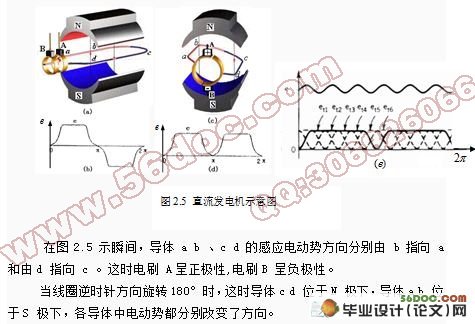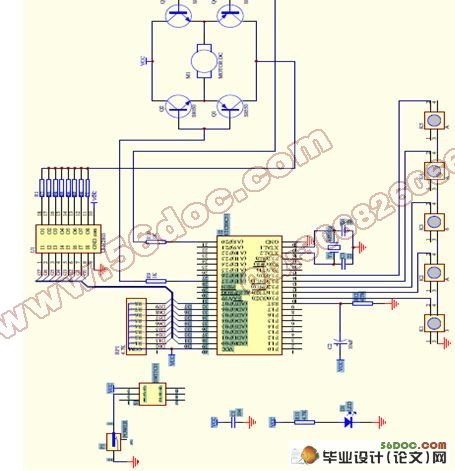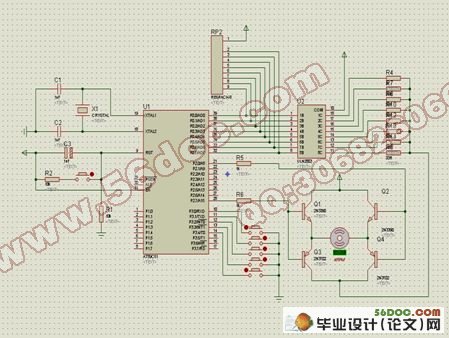用单片机控制PWM信号直流电机的设计
无需注册登录,支付后按照提示操作即可获取该资料.
用单片机控制PWM信号直流电机的设计(12000字)
摘 要
利用stc89c52系列单片机控制PWM信号从而实现对直流电机转速的控制。以5*1矩阵键盘作为输入达到控制直流电机的启动、停止、速度和方向的目的。采用c语言编程,实现了直流电机的调速和正反转控制。采用了PWM技术通过改变频带宽度对直流电机进行调速控制,再通过对占空比的计算达到精确调速的目的。此外,本文中还采用了芯片uln2083作为直流电机正转调速功率放大电路的驱动模块完成在主电路中对直流电机的控制。实验证明:通过按键的调试可以实现控制直流电机的启动、停止、速度和方向。
关键词:stc89c52;直流电机;PWM;
Abstract
This article mainly introduces the method to generate the PWM signal by using stc89c52 single-chip computer to control the speed of a D.C. motor. Achieves the control direct current machine's start, the stop, the speed and the direction goal by the 5*1 matrix keyboard as the input Uses the c language programming, has realized direct current machine's velocity modulation and is reversing the controsed the PWM technology to carry on the velocity modulation control through the change bandwidth to the direct current machine Through the computation achieves the precise velocity modulation again to the dutyfactor the goal. In addition,uln2803 has been used as an actuating device of the power amplifier circuit which controls the speed of rotation of D.C. motor. What’s more, tachogenerator is used in this system to measure the speed of D.C. motor. Experimental proof: through the adjustment of the button control effectively the dc motor of the start and stop, speed and direction
Key words: stc89c52;Continuous Current Dynamo; PWM;
课题任务与研究内容
本课题的研究对象为直流电动机,对其转速进行控制。基本思想是利用STC89C52自带的PWM口,通过调整PWM的占空比,控制电机的电枢电压,进而控制转速。
系统硬件设计为:以STC89C52为核心,由转速环、显示、按键控制等电路组成。



目录
摘 要 I
Abstract III
第1章 绪论 1
1.1 课题研究及背景 1
1.2 直流电机控制现状及发展趋势 1
1.3 课题任务与研究内容 2
第2章 直流电机调速的设计方案与比较 3
2.1 PWM的基本原理 3
2.2 电机调速控制模块 3
2.3 直流电机的结构及工作原理 4
第3章 硬件系统的设计 9
3.1 系统总体框图 9
3.2 功率放大驱动电路设计 12
3.2.1芯片ULN2803性能及特点 12
3.2.2 ULN2803的引脚图以及功能 12
3.3 主电路设计 14
第4章 软件设计 19
4.1 程序流程图 19
4.2 电动机PWM驱动模块的电路设计 21
4.3 软件的仿真 22
4.4 P1转速调节器原理图及参数计算 22
4.5 直流电机的调速功能仿真 22
4.5.1调速前的波形图 23
4.5.2调速后的波形图 24
4.5.3电机转速的测量并显示功能仿真 24
4.6软件设计中的特点: 24
第5章 系统调试 25
5.1 软件调试 25
5.2 硬件调试 26
5.2.1排除元器件失效 26
5.2.2排除电源故障 26
5.2.3联机仿真调试 27
第6章 总结与展望 29
参考文献 31
致 谢 32
附录 33
